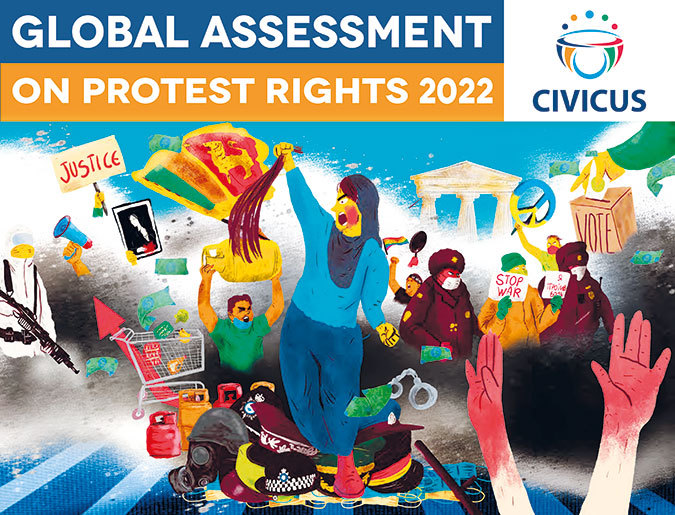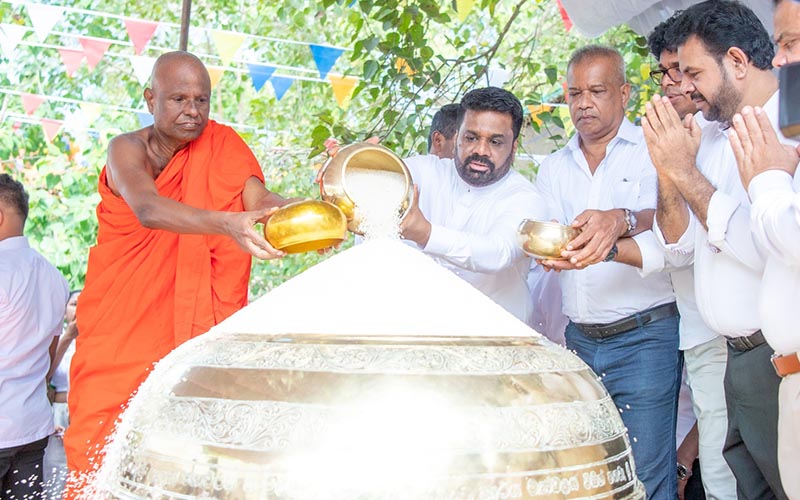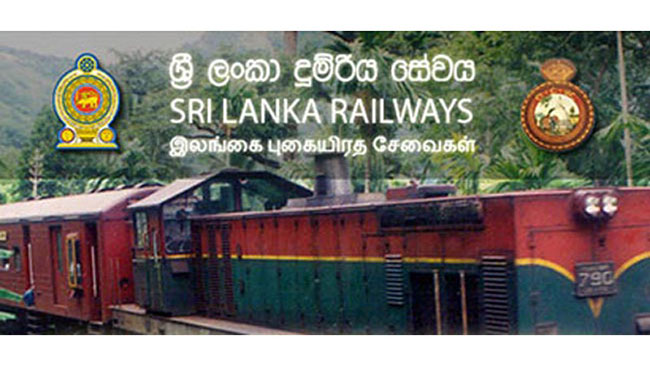News
Lankan government suppresses peaceful protests

The right to dissent is under attack in Sri Lanka as the ruling regime uses repressive laws and brute force to silence protesters, finds a new global assessment by the CIVICUS Monitor, an online research platform that tracks fundamental freedoms in 197 countries and territories says.
A report, titled Global Assessment on Protest Rights 2022 by the CIVICUS Monitor, released last Wednesday says: “In Sri Lanka, more than a hundred people, involved in the mass protests over the economic crisis, have been arrested, including students, civil society activists and unionists. There have been reports of alleged torture and ill-treatment in detention and some people have been charged with ‘unlawful assembly’ and’ obstructing the duties of police officers’, among other offences. The government also used the draconian Prevention of Terrorism Act to detain three student activists, in August 2022. Other tactics used to penalise protesters include travel bans.”
“Over the past year, economic, political and governance issues were key drivers of protests. The spike in the prices of fuel and food led to mass demonstrations against the rising cost of living. Inflation and shortage of essential goods, together with economic mismanagement, underpin poverty and inequality, which prompted numerous demonstrations, demanding governments to confront the economic crises and end corruption.”
The CIVICUS Monitor data shows that restrictions to freedom of peaceful assembly have occurred in at least 100 countries, from October 2021-September 2022. The research documents a timeline of frequent violations that take place before, during and after protests. In numerous countries, restrictive laws or emergency regulations have been deployed to make it difficult for people to protest, including the need for permits and levying fees. Authorities have also used outright bans to prevent protests from happening, often using grounds such as disturbing public order, security concerns, or public health reasons.
“In Sri Lanka, the government has, since April 2022, repeatedly used state of emergency regulations to curtail mass protests, related to the country’s economic crisis. This has allowed the authorities to arrest anLankan government suppresses peaceful protests
The right to dissent is under attack in Sri Lanka as the ruling regime uses repressive laws and brute force to silence protesters, finds a new global assessment by the CIVICUS Monitor, an online research platform that tracks fundamental freedoms in 197 countries and territories says.
A report, titled Global Assessment on Protest Rights 2022 by the CIVICUS Monitor, released last Wednesday says: “In Sri Lanka, more than a hundred people, involved in the mass protests over the economic crisis, have been arrested, including students, civil society activists and unionists. There have been reports of alleged torture and ill-treatment in detention and some people have been charged with ‘unlawful assembly’ and’ obstructing the duties of police officers’, among other offences. The government also used the draconian Prevention of Terrorism Act to detain three student activists, in August 2022. Other tactics used to penalise protesters include travel bans.”
“Over the past year, economic, political and governance issues were key drivers of protests. The spike in the prices of fuel and food led to mass demonstrations against the rising cost of living. Inflation and shortage of essential goods, together with economic mismanagement, underpin poverty and inequality, which prompted numerous demonstrations, demanding governments to confront the economic crises and end corruption.”
The CIVICUS Monitor data shows that restrictions to freedom of peaceful assembly have occurred in at least 100 countries, from October 2021-September 2022. The research documents a timeline of frequent violations that take place before, during and after protests. In numerous countries, restrictive laws or emergency regulations have been deployed to make it difficult for people to protest, including the need for permits and levying fees. Authorities have also used outright bans to prevent protests from happening, often using grounds such as disturbing public order, security concerns, or public health reasons.
“In Sri Lanka, the government has, since April 2022, repeatedly used state of emergency regulations to curtail mass protests, related to the country’s economic crisis. This has allowed the authorities to arrest and detain suspects without warrants and due process safeguards. Under the state of emergency, curfews were imposed, internet access restricted and social media shut down.”
The detention of protesters is the most prevalent violation. Those exercising their fundamental freedoms have been detained in at least 92 countries over the past year. The detention periods can range from hours to indefinite. Peaceful protesters against the war in Ukraine, the solidarity for women’s rights in Iran and activists in Sri Lanka demanding a change of government, have all faced lengthy stays in detention.
Excessive force has also been a recurring theme of this year’s protests. Demonstrators have been met with water-cannons, batons, tear-gas and other acts of brute-force in over 40% of the countries recording protests. Police violence at protests has been the most prevalent in the Americas and the Asia-Pacific.
Most disturbing of all has been the unlawful killing of protesters, which has occurred in at least 24 countries. From Myanmar to the United States, protesters have died during protests. In too few of the countries, have independent investigations been conducted by the authorities and the perpetrators of the killings held accountable.
“In most regions this year, the story on protest rights is bleak. At a time when civic rights are needed more than ever to hold governments accountable, the space to protest is being heavily restricted. We need governments to respect the right to peaceful assembly, investigate abuses by security forces and work closely with civil society moving forward to halt this downward spiral and push back against the authoritarian forces at work,” said Julieta Zurbrigg, Research Advisor, CIVICUS Monitor.
Governments used law, policy, and practice to suppress peaceful and non-violent gatherings in the backdrop of rules and regulations, said the report released days before Human Rights Day observed by the international community every year on December 10. The report stated that freedom of peaceful assembly faced restrictions in at least 100 of the 197 countries across the globe.
d detain suspects without warrants and due process safeguards. Under the state of emergency, curfews were imposed, internet access restricted and social media shut down.”
The detention of protesters is the most prevalent violation. Those exercising their fundamental freedoms have been detained in at least 92 countries over the past year. The detention periods can range from hours to indefinite. Peaceful protesters against the war in Ukraine, the solidarity for women’s rights in Iran and activists in Sri Lanka demanding a change of government, have all faced lengthy stays in detention.
Excessive force has also been a recurring theme of this year’s protests. Demonstrators have been met with water-cannons, batons, tear-gas and other acts of brute-force in over 40% of the countries recording protests. Police violence at protests has been the most prevalent in the Americas and the Asia-Pacific.
Most disturbing of all has been the unlawful killing of protesters, which has occurred in at least 24 countries. From Myanmar to the United States, protesters have died during protests. In too few of the countries, have independent investigations been conducted by the authorities and the perpetrators of the killings held accountable.
“In most regions this year, the story on protest rights is bleak. At a time when civic rights are needed more than ever to hold governments accountable, the space to protest is being heavily restricted. We need governments to respect the right to peaceful assembly, investigate abuses by security forces and work closely with civil society moving forward to halt this downward spiral and push back against the authoritarian forces at work,” said Julieta Zurbrigg, Research Advisor, CIVICUS Monitor.
Governments used law, policy, and practice to suppress peaceful and non-violent gatherings in the backdrop of rules and regulations, said the report released days before Human Rights Day observed by the international community every year on December 10. The report stated that freedom of peaceful assembly faced restrictions in at least 100 of the 197 countries across the globe.
Latest News
We are working to stabilize and restructure an economy that was in disarray -President

The National New Paddy Harvesting Festival (Aluth Sahal Mangalya), a traditional annual ceremony of offering the first portion of the freshly harvested Maha season paddy to the sacred Sri Maha Bodhi, was held this morning (04) under the patronage of President Anura Kumara Disanayake at the historic Sri Maha Bodhi premises in Anuradhapura.
The ceremony was organized by the Ministry of Agriculture and the Department of Agrarian Services under the theme “In unison, let us cultivate the land, to build a self-sufficient nation” (අහරින් ස්වයංපෝෂිත දැයක් තනන්නට එක මිටට ගොවි බිමට), following the guidance of the Atamasthanadhipathi, the most Venerable Pallegama Hemarathana Nayaka Thera.
This ritual, which dates back to the era of ancient monarchs, saw the participation of farmers from across the country. In accordance with tradition, they prayed for timely rains and fertile fields and invoked blessings for a self-sufficient and prosperous economy through agriculture.
President Anura Kumara Disanayake first paid homage and received blessings from the sacred Jaya Sri Maha Bodhi before joining the ceremonial proceedings.
The sacred procession, which carried the newly harvested paddy from near the historic Sinha Kanuwa in Anuradhapura, arrived at the sandy courtyard (වැලි මලුව) of the Sri Maha Bodhi, marking the ceremonial commencement of the New Paddy Harvest Festival.
The Most Venerable Pallegama Hemarathana Nayaka Thera commenced the ritual by filling the golden bowl with the new paddy, after which representatives from all provinces added paddy from their respective regions, symbolically filling the golden bowl.
President Anura Kumara Disanayake also participated in this ritualistic moment, amidst the chanting of Pirith by the Maha Sangha.
A vessel of pure bee honey, traditionally offered to the Sri Maha Bodhi, was ceremonially presented to the President by Deputy Leader of the Vedda Community U.W. Bandiyala Eththo.
The vessel of ghee, brought from the historic Saman Devalaya in Sabaragamuwa, was also presented to President Anura Kumara Disanayake, to be used in the customary ghee offering at the Sri Maha Bodhi.
The President also received the commemorative plaque of the National New Paddy Harvest Festival and presented tokens of appreciation to farmer leaders who have made significant contributions to the development of the country’s agriculture sector.
As part of the initiative to secure a pest-free harvest, the President participated in the distribution of pest-resistant seed paddy to farming communities across the provinces.
Addressing the subsequent official ceremony, President Anura Kumara Disanayake stated that the current government is working to transform an economy that was in disarray. He noted that the Paddy Marketing Board is burdened with a debt of Rs. 28 billion, while harvested paddy is being left to spoil in storage.
The President emphasized that the current administration has accepted the responsibility of restoring and restructuring this disorderly system. He added that the government expects the support not only of the state machinery related to agriculture but also of all farming communities. He affirmed the intention to integrate Sri Lanka’s cultural and traditional systems to reclaim the legacy of the agricultural economy and thereby strengthen the national economy.
President Disanayake further stated that the country’s ancient kings achieved greatness through their contributions to agriculture and irrigation and that self-sufficiency in food was a critical factor in that success.
He highlighted that sustainable development has become a global discourse today and that Sri Lanka’s “Tank Cascade System” or “Vapi System,” stands as a remarkable example of sustainable development. The country’s irrigation system, which dates back nearly 2,000 years, continues to contribute to the advancement of agriculture even today.
As such, the government has allocated Rs. 2 billion in the current budget to rehabilitate the irrigation system and renovation work on the North Central Maha Ela Project has already commenced to revitalize the country’s agricultural industry. He added that the government also plans to develop seed farms to produce self-sufficient seeds, while protecting genetic ownership.
He further emphasized the need for fair prices for agricultural produce, both for farmers and consumers. Due to long-standing market distortions, the government will intervene over the next two to three harvesting seasons to ensure both parties receive fair prices.
The President also stated that the necessary provisions for such state interventions have been made in the current budget. Steps have been taken to create storage capacity to hold 300,000 metric tons of paddy, which is expected to mitigate market distortions going forward.
Among those present at the occasion were the Chief Incumbent of the Ruwanweliseya and Chancellor of the Rajarata University, Most Venerable Ithalawetunuwewe Gnanatillake Thera, the Chief Incumbent of the Lankaramaya, Most Venerable Ralapanawa Dhammajothi Thera and members of the clergy; Minister of Agriculture, Livestock, Lands and Irrigation K.D. Lalkantha; Minister of Trade, Commerce, Food Security and Cooperative Development Wasantha Samarasinghe; Governor of the North Central Province Wasantha Kumara Wimalasiri; and Deputy Minister of Agriculture and Livestock Namal Karunaratne, along with a large number of farmer leaders and other dignitaries.
- (PMD)
Latest News
Indian PM Modi arrives in Sri Lanka on a three day state visit

Prime Minister of India Narendra Modi arrived in the island a short while ago on a three-day state visit.
The Indian Prime Minister was received at the Katunayake International Airport by Sri Lanka’s Minister of Foreign Affairs Vijitha Herath.
PM Modi is accompanied by Minister of External Affairs S. Jaishankar, Indian National Security Advisor Ajit Doval, Indian Foreign Secretary and several senior officials of the Government of India.
Latest News
Special Train Services during Sinhala and Tamil New Year

The General Manager of Railways has announced that the following special train services will operate during the Sinhala and Tamil New Year period.
1. From Colombo Fort to Badulla – departing Colombo Fort at 1930 hrs on 11th, 12th, 19th and 20th April
2. From Badulla to Colombo Fort – departing Badulla at 1750 hrs on 11th, 12th, 19th and 20th April
3. From Galle to Anuradhapura – departing Galle at 0400 hrs on 12th and 13th April
4. From Anuradhapura to Galle – departing Anuradhapura at 1500 hrs on 12th and 13th April
5. From Colombo Fort to Galle – departing Colombo Fort at 120 hrs on 10th, 11th, 15th and 20th April
6. From Galle to Colombo Fort – departing Galle at 0610 hrs on 11th, 12th, 16th and 21st April
7. From Colombo Fort to Galle – departing Colombo Fort at 1330 hrs on 12th and 13th April
8. From Colombo Fort to Kankasanthurai [Intercity Express] – departing Colombo Fort at 0530 hrs on 11th and 18th April
9. From Kankasanthurai to Colombo Fort [Intercity Express] – departing Kankasanthurai at 1350 hrs on 11th and 18th April
10. From Beliatta to Colombo Fort – departing Beliatta at 0825 hrs on 12th, 13th, 18th, 19th and 20th April
-

 News5 days ago
News5 days agoBid to include genocide allegation against Sri Lanka in Canada’s school curriculum thwarted
-

 Sports6 days ago
Sports6 days agoSri Lanka’s eternal search for the elusive all-rounder
-

 News7 days ago
News7 days agoGnanasara Thera urged to reveal masterminds behind Easter Sunday terror attacks
-

 Sports2 days ago
Sports2 days agoTo play or not to play is Richmond’s decision
-

 News6 days ago
News6 days agoComBank crowned Global Finance Best SME Bank in Sri Lanka for 3rd successive year
-

 Features6 days ago
Features6 days agoSanctions by The Unpunished
-

 Features6 days ago
Features6 days agoMore parliamentary giants I was privileged to know
-

 Latest News4 days ago
Latest News4 days agoIPL 2025: Rookies Ashwani and Rickelton lead Mumbai Indians to first win











